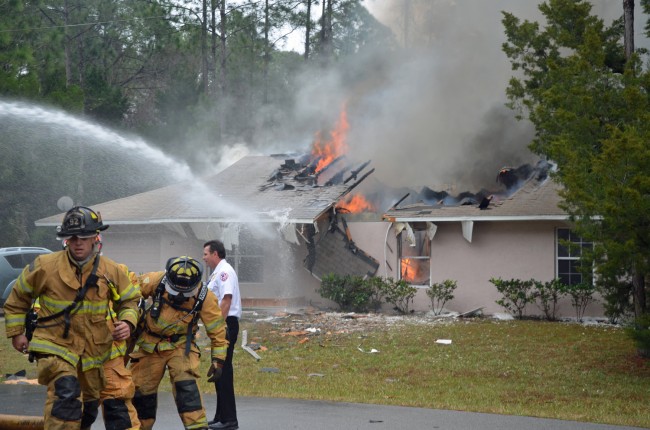
Last week WNZF’s Dave Ayres invited three of us—Palm Coast Mayor Jon Netts, Palm Coast Observer Executive Editor Brian McMillan, and me—to talk about the year’s top 10 stories on Free For All Friday. David had initially wanted to hear my 10 predictions for the coming year. But that would have risked making a tradition of what started as a lark and quickly became an embarrassment. Last year’s predictions made it on the air but not in print (I was right about the end of affirmative action and congressional cowardice on any new gun control, wrong on the Syrian president’s downfall and Bunnell—our little Damascus—maintaining the status quo). This year’s predictions will be outsourced to the comment section, if any hackers in Bangalore are interested.
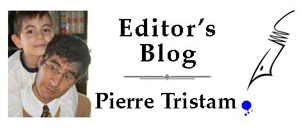 Ranking the year’s top stories is itself a tradition as old as yellow journalism. It’s no more useful—and probably less so—than any generic Cosmo list: 42 tips for the best sex ever seems to me a more practical way to warm up to New Year’s than a rehash of 10 stale news stories, though given Palm Coast’s demographics more than two tips may be asking for coronary trouble on a day of the year when half ER staffs are drunk out of their gourds and the other half are no-shows. Stale news stories and a bottle of fake champagne may be the safer bet.
Ranking the year’s top stories is itself a tradition as old as yellow journalism. It’s no more useful—and probably less so—than any generic Cosmo list: 42 tips for the best sex ever seems to me a more practical way to warm up to New Year’s than a rehash of 10 stale news stories, though given Palm Coast’s demographics more than two tips may be asking for coronary trouble on a day of the year when half ER staffs are drunk out of their gourds and the other half are no-shows. Stale news stories and a bottle of fake champagne may be the safer bet.
Brian’s list and mine were pretty close, if not in rankings at least in substance, with the Observer’s usual tilt to brighter stories: If the Observer is more Frank Capra than Mother Jones—an angel gets its wings with every turn of the page–FlaglerLive is usually more conversant with the Russian-novel plots lurking beneath Flagler’s Thomas Kinkade façades. Few angels’ wings are as authentic as they appear.
Netts brought no list. He was there as the Dan Dierdorf of the hour—for color. He surprised us with his answer to a late-breaking question: his days as an elected official will be over come 2016. No county commission run for him. No other office. Like Dierdorf, he’s retiring for good, which is a shame because regardless of his occasionally wayward politics and allegiance to an older, mustier version of Palm Coast than we need, he remains that rarity among local politicians in whom reason, intelligence and culture manage to coexist without pretentions and despite the effects of a job naturally hostile to all three. His departure will be among the more cheerless and consequential stories of that year.
But first, the one we’re burying today.
The stories are presented in order but not because one is necessarily more important than the other. People like their lists numbered. Feel free to object, rearrange, add, delete or, more honorably—you really ought to have much better to do today—ignore.
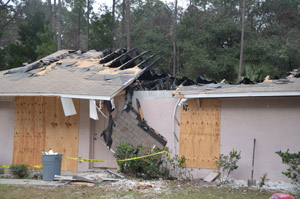
1. The Plane Crash On Utica Path. In a year of plane crashes and weird plane mishaps in Flagler County (five in all), the Jan. 5 crash of a BE35 plane into a house at 22 Utica Path was not only the worst, but also the worst “accident” of the year by any mode of transportation in the county, killing three people aboard the plane: Pilot Michael Anders, a Spanish teacher who was celebrating his 58th birthday that day, Duane Shaw, 59, and Charisse Peoples, 42. They were flying from Fort Pierce to Kentucky when the plane developed engine trouble and fell, literally fell, barely a mile short of the runway at Flagler County Airport, into the back of Suzanne Crockett’s house. She was home. She dove out of a window and was spared. Local media went wild over Crockett’s story, much of it haloed in unquestioned praise and thanks to god. Had the three victims had a voice in the matter, they may not have agreed as enthusiastically. In April an experimental plane crashed in Lake Disston with two people aboard. They swam ashore safely. The next month a Phoenix East Aviation plane’s engine trouble forced it to land on Palm Coast Parkway. No injuries. An Embry-Riddle training plane lost a door above Palm Coast in early October. The door, which would have killed anything in its path, crashed in the cul de sac of a C-Section home near 16 College Court. Three months later, the same plane crash-landed at the Flagler County Airport because of faulty landing gear. The plane was finally grounded.

2. The Palm Coast Tornado. On Dec. 14 an EF1 tornado touched down erratically along a 1.5 mile of Palm Coast’s B, C and F Sections, demolishing seven homes and damaging almost 200, most of them lightly. Somehow, no one was killed. No one was injured. Not even a pet was reported missing. The response was immediate and impressive, especially in the immediate aftermath of the twister, when neighbor aided neighbor and Palm Coast’s firefighters went to work, taking inventory of the damage, house by house, in the darkness of that Saturday night, battling downed power lines and trees, but also battling gawkers. They got on Fire Chief Mike Beadle’s nerves enough that he asked for the area to be restricted. In subsequent days and perhaps inevitably there was a little something exploitative about the way Palm Coast turned the event into clarions of self-congratulations. The city did an excellent job, but it wasn’t faced with the sort of challenge that should have put that certainty in question. If we cannot take for granted a local government handling an emergency of that minor scale (so minor that FEMA, the Federal Emergency Management Administration, did not feel compelled to react and had to correct Palm Coast’s presumptions on that count), we’re in trouble. Let’s hope it’s not recorded in city annals as Palm Coast’s Masada.
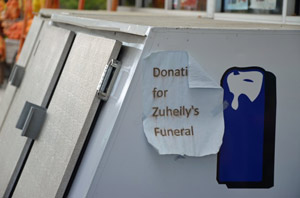
3. Murder at the Mobil Mart. On Feb. 21, Roman Rosado, a 32-year-old mother of six who was battling her ex-husband over custody and child support matters, was gunned down execution style as she worked the late shift at the Mobil Mart on State Road 100, just east of I-95. A man walked in, turned, lifted a handgun, fired several times, and walked out. A tip and assiduous investigating led Flagler County Sheriff’s detectives to arrest a drifter with a bank account called Joseph Bova in Boca Raton in mid-September. Bova was caught on surveillance video entering the store a few hours before the shooting. His clothes matched those seen worn by the assailant. His gun matched the one used in the shooting. Bova allegedly never denied that the gun was his, and that it had never left his possession. He did not confess. There is still no motive for the killing. And Bova himself is not necessarily helping his own case. His first court appearance was a puzzle. His trial, should there be one, will be no less. He is now represented by Ray Warren, a public defender. Rosado’s six children have been scattered in several different homes. The murder was a shock for its apparent randomness and cold brutality. It was one of five murders somehow connected to Flagler, which won’t look good on Jim Manfre’s balance sheet, though the spike was entirely coincidental, if not geographic, and not all of it will be on Flagler’s statistical crime sheet (St. Johns will count two of them): a few days after he became sheriff, Jim Manfre found himself in the marsh behind 16 Covington Lane home, where the decomposed body of a man was found. He’d been stabbed. He’d died in late December 2012, but the murder is recorded on 2013’s ledgers. The man was later identified as Dennie Keith Cayton, 61, who had lived at the Covington Lane home. The case is unsolved. In May, the human remains found on Flagler County’s side of Flagler Estates was identified as the murdered body of Barbara Parchem, a 67-year-old resident of St. Johns County who was apparently beaten to death. Sty. Johns County is investigating that murder. Weeks later, another body was found in Flagler Estates, on the St. Johns County side, that of Edward Mullener. It was in the trunk of a burning car, burned almost beyond recognition. In late July, a St. Johns County grand jury indicted two Palm Coast residents, Adam Boyles, 24, and Charles Danny Massey, 38, both of 6 Holly Road in Palm Coast, for Mullener’s murder: he’d been tortured and beaten on June 13 as the result of an alleged love triangle gone awry. He was found dead on June 14. The two men will be tried in St. Johns County. The same month, the evening of June 1, the bludgeoned body of Leonard Lynn, 76, was found at 26 Ryken Lane in Palm Coast. He’d been dead several days. His roommate, Erick Niemi, was subsequently arrested and charged with first-degree murder. He confessed to beating Lynn during an argument about house rules.
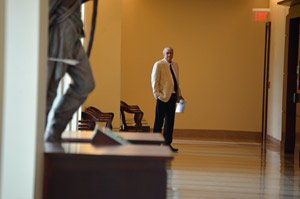
4. Paul Miller Is Sentenced to Life in Prison. The week-long Paul Miller trial in May for his murder of Dana Mulhall during an argument over Miller’s dogs in Flagler Beach in 2012 was Flagler County’s version of a Stand Your Ground trial, though the Stand Your Ground defense was never explicitly invoked. Miller, a self-described hillbilly from Tennessee, had enough of his neighbor Dana Mulhall complaining about Miller’s yappy dogs, so he carefully planned to shoot him, and did—five times, as Mulhall stood, then ran away, then fell, then crawled as Miller kept shooting, all on Mulhall’s side of the fence that divided the two men’s properties, a fence Mulhall never crossed, a fence Mulhall never came close to crossing, according to the prosecution and the evidence at the scene. But he’d crossed Miller’s honor, or whatever it was Miller thought had been crossed, and that warranted, in a spiteful mind the jury saw for itself when Miller testified in his defense—dooming his chances more than helping them—the murder of a man at most guilty of being flush with the excitement of a few drinks. Jury deliberations were brief. Miller, 66, will not see another day’s freedom. He is in a prison in South Florida, an unnecessary cruelty perpetrated by Florida’s indifferent prison system: Miller could have been sent to a prison closer to his family, but the Department of “Corrections” will never be accused of having a heart.
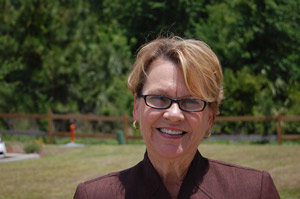
5. Janet Valentine’s Stroke and Succession: It was not the way Superintendent Janet Valentine wanted to end a distinguished career as an educator, most of it in Flagler County, the last three and a half years of it as superintendent. Just before Thanksgiving, Valentine suffered a stroke. She was incapacitated. She is recovering. But she won’t return to work. She had just put in place the mechanics of a succession. The district seemed to have in Jacob Oliva, the assistant superintendent Valentine had appointed soon after she had to take time off to nurse her daughter back to health after a terrible accident, an ideal replacement. But a few voices in the community—black voices, specifically—made noise and argued against a quick coronation. They made good points but offered lousy remedies. The school board obliged by appointing a search committee. But the committee was then promptly emasculated with the introduction of a “facilitator” who was nothing of the sort: Jerry Copeland is a brilliant strategist, a negotiator made of oak and a hard-ass when he needs to be, which makes him the perfect collective-bargaining negotiator for the board. That’s been his capacity for years, and for handsome pay ($24,600 in just five months since July). But a “facilitator” he is not. He is an enforcer: he is hired to get a specified result. And the specified result the district is looking for is its original succession plan: Jacob Oliva as superintendent. Copland’s presence on the committee—as an example of his gall, he called himself a volunteer—steered the discussion, the job description and the committee’s work in pre-determined directions, turning the committee’s actual volunteers into manipulated extras. The board could have saved everyone a lot of trouble, time and dignity by having the courage to enact the succession plan Valentine had in place, and appointing Oliva to a position most board members want him to fill, and which he has every reason to fill. But we have a way to go yet with that comedy.
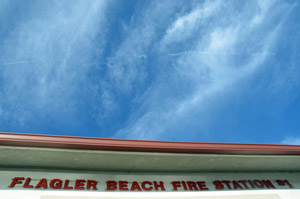
6. Upheavals in Flagler Beach. Where to start with this one? It’s saying a lot when Flagler Beach can supplant Bunnell for political ribaldry, but for a time this year, it did. There was the business over drinking on the job that cost the fire chief and three firefighters their jobs after a $22,000 mercenary investigation that formalized decisions already taken. There was, in the sort of ironies fiction writers could never get away with, the appointment of Bobby Pace, a convicted drunk driver, as the chief’s interim replacement, then his removal when Pace was brought up on charges of obstruction of justice (and destruction of evidence, though that one didn’t stick), then—after another minor fiasco involving another interim—his reappointment when the charge was conveniently reduced to a deferred prosecution agreement (in other words, the State Attorney’s way of saying don’t do it again and we’ll forget it), and finally, his permanent appointment as the new fire chief—make that fire Captain, as City Manager Bruce Campbell prefers it—at the head of the most insecure but PR-savvy fire department in the county. The city commission briefly flirted with talk of consolidation with the county’s fire department, but in Flagler Beach pride of turf is thicker than logic, so the idea died. That was just one half of Campbell’s remaking of city government in his image. He also pushed out long-time Police Chief Dan Cody and appointed in his place Matt Doughney, the former Daytona Beach cop, whose only scratch in a distinguished career is hitting a deer while job-hunting years ago, in Polk County, in a department-issued vehicle. He can’t be blamed: weird things always happen in Polk County, where even deer are weirded out by the local sheriff.
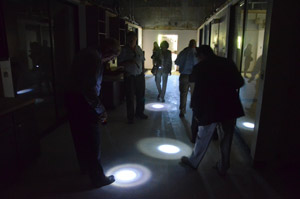
7. Flagler County Goes Bonkers For Clunkers. Donald Trump wrote The Art of the Deal. Flagler County Administrator Craig Coffey wrote its Flagler-language translation. Art does not appear in the title. In two big deals for ruins not worth the price paid for either, Coffey got the county commission to shell out $1.23 million for the old, 60,000 square-foot Memorial Hospital that local attorney Michael Chiumento had bought a decade ago as an investment (with partners who’d change along the way) but couldn’t unload. He found a lifeline in Coffey and a confederacy of gullibility on the commission. He and his partners walked away with their own version of a tax-funded bail-out. The originally sunshine-challenged negotiations were designed to give the sheriff’s headquarters new digs, though the sheriff was just as willing to move into the old county courthouse annex, and the final bill of the hospital’s resurrection will likely show that building the sheriff a new place on land already owned by the county would have been cheaper, more sensible and less greasy. That was one deal. The second was to the benefit of developer Mori Hosseini, who’d been wanting to unload the Plantation Bay Utility for years. He’d neglected it. It was in pieces. State regulators were on his back. He needed a bail-out. He got one from the reliable commission, which paired up with Bunnell (not because the county respects Bunnell; it doesn’t. But because Bunnell could, as a city, get cheaper loans than could the county) to fork over close to $6 million for a utility worth not much more than the sludge it is designed to process. A third deal was the unloading of a clunker: the county “gave” Bunnell the old courthouse, a building it couldn’t wait to unload because it’s been a money pit. Bunnell mistook the passing of the rotten potato for a gift, sight unseen. It may regret it, as the city will never be able to afford either fully repairing the building or maintaining it.
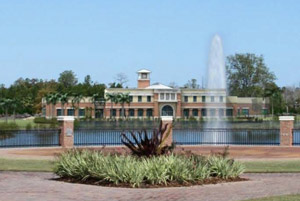 8. Palm Coast Gets Its City Hall. Not to be outdone yet again by the county’s debauchery at taxpayers’ expense, Palm Coast finally approved its own Little Taj Mahal—starting with a $6.9 million building in Town Center that will not include public meeting spaces or a community center, and that will use almost $6 million in general fund dollars (owed the general fund by the Town Center redevelopment district, which the city controls). It’s the same scheme, slightly scaled down, that City Manager Jim Landon has been pressuring the council to approve for three years, with its central premise a snub of voters, who would undoubtedly have rejected it had they been asked in a referendum. But Palm Coast’s spiritual sister-city isn’t Pyongyang for nothing. This time the manager had help from the Palm Coast Observer and the Flagler County Chamber of Commerce, whose president—Rebecca deLorenzo—is wife to council member Jason deLorenzo, whose religion, as political director of the local homebuilders association, requires him to bow before any new construction plans anywhere. It was an effective, rapid one-two-three punch that got a unanimous vote from the council, including that of Bill McGuire, who uncharacteristically went French and chose surrender rather than continue what until then had been a Churchillian stand against a new Hotel de Ville.
8. Palm Coast Gets Its City Hall. Not to be outdone yet again by the county’s debauchery at taxpayers’ expense, Palm Coast finally approved its own Little Taj Mahal—starting with a $6.9 million building in Town Center that will not include public meeting spaces or a community center, and that will use almost $6 million in general fund dollars (owed the general fund by the Town Center redevelopment district, which the city controls). It’s the same scheme, slightly scaled down, that City Manager Jim Landon has been pressuring the council to approve for three years, with its central premise a snub of voters, who would undoubtedly have rejected it had they been asked in a referendum. But Palm Coast’s spiritual sister-city isn’t Pyongyang for nothing. This time the manager had help from the Palm Coast Observer and the Flagler County Chamber of Commerce, whose president—Rebecca deLorenzo—is wife to council member Jason deLorenzo, whose religion, as political director of the local homebuilders association, requires him to bow before any new construction plans anywhere. It was an effective, rapid one-two-three punch that got a unanimous vote from the council, including that of Bill McGuire, who uncharacteristically went French and chose surrender rather than continue what until then had been a Churchillian stand against a new Hotel de Ville.
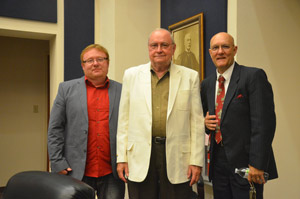
9. Rise of the Three Horsemen and the End of the Martinez Era in Bunnell. Bill Baxley’s election to the Bunnell City Commission in March, and Daisy Henry’s defeat, shifted power away from Mayor Catherine Robinson and toward long-time dissenter Elbert Tucker and his more recent sometime-ally, John Rogers. The three horsemen immediately went to work remaking Bunnell in their image, not always elegantly, and at times with embarrassing sloppiness, with Manager Armando Martinez paying the price along the way. He was eventually fired (his contract wasn’t renewed) and the city administration self-purged as they quit one after the other: City Manager Sid Nowell, City Clerk Dan Davis, Finance Director Cynthia Bertha, Police Chief Jeff Hoffman, and City Attorney Lonnie Groot, who lasted only a few months before sniping over his bills, which mistook Bunnell for Palm Coast, got the better of him. In September the three horsemen hired Larry Williams as their new manager. He took his time putting his name-plate by his office door. All along the city was celebrating its centennial, capping the year with a beautiful Christmas bash that seemed to mask in fake snow the continuing conflict between the commission’s Pharisees and Sadducees. There’s another election in March, with John Rogers’s and Jenny Crain-Brady’s seats up. As Downton Abbey goes, so goes Bunnell.
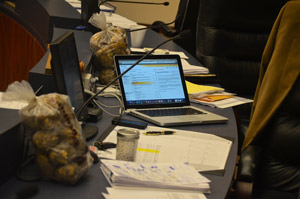
10. The School Board Loses a Referendum. On June 7, a referendum asking voters to increase their property taxes modestly so the school district could make up some lost revenue from the state failed, with 57 percent of voters opposed. It was a surprise, and it wasn’t. A surprise, because voters have consistently supported the district’s supplementary taxes, and did so as recently as last summer. But it was also partly because they had so recently approved a sales surtax that they exhibited some tax fatigue this time around. It didn’t help that voters felt burdened by sharply rising utility costs in Palm Coast. Nor did it help that the school board’s strategy this time around lacked unity and projected a confused, unconvincing message overly focused on adding cops in elementary schools and too-little focused on explaining how state funding was declining. But the district also faced a mountain of lies and misinformation spread by the local tea party. Various attempts to correct the record fell short. As it turned out, the feared reduction of $1.8 million because of reduced enrollment didn’t materialize: enrollment has been stagnant, but it hasn’t fallen so much as to deny the district the $1.8 million.
Surely innumerable other stories could have made the list. The departures of Florida Hospital Flagler CEO David Otatti and Flagler Tourism Director Georgia Turner were significant losses for the county: in his brief tenure here Ottati turned the hospital into the county’s largest private employer. Turner developed the county’s niche sports events and got the local arts organizations to play together as never before. Jim Manfre’s unsettled sheriff’s office, where purges have followed purges, has been too much in the news for the wrong reasons. The relative success of the county’s economic development department has been encouraging, but the sharp decline in the county’s workforce—1,000 people in one year—is worrisome, as it is mainly the reason for the declining unemployment rate, rather than the addition of net new jobs.
On a somewhat personal note, it’s no small thing that FlaglerLive broke readership records several times this year and ended the year with its best-ever month, averaging 14,000 readers a day and logging 130,000 unique visitors for the month, placing us above several similar web-only news services in larger cities and with much wealthier financial backing, including the Florida Center for Investigative Reporting, the St. Louis Beacon, Oakland Local, the Voice of San Diego and the Rapidian in Grand Rapids, Mich., which has twice the population of Flagler. I’m basing my figures on the Knight Foundation’s recent study of non-profit news websites, which listed readership numbers for those sites. Compared to all those sites though, FlaglerLive’s local financial contributions from readers are much too low: that’s where you can help.
That wraps it up for this year. Just as surely as many other stories could have made the list above, innumerable other stories have been missed altogether. Nothing we can do about it now: 2013 is over, not a moment too soon. With your help, we can only hope to do better next year, on all counts. Happy New Year.
![]()
Pierre Tristam is FlaglerLive’s editor. Reach him by email here.






























Charles Ericksen Jr says
I would have added two, amazing life saving events.
1. An 800 call center employee, talking a grandmother through the steps necessary to save her granddaughter’s life, The granddaughter had fallen into the swimming pool, and was pulled lifeless from the pool.
2. Carl Laundrie, a Flagler County employee, rescued from a sunken car, revived, and back to work in record time.
Anonymous says
Pierre…Love the way you wrote #6…good call on your assessment of the situation. Let’s hope justice will prevail in 2014! Also am so grateful that nobody was even injured during that tornado and it was wonderful that folks helped each other out. Here’s to people acting peacefully and kindly towards each other in the new year!
Question says
Ever think in #6 that justice did prevail and what was put out on the table wasnt exactly how things happened??? Perhaps a classic case of “smoke and mirrors” and let the media run with it, it worked in putting doubt in the dept… How ever, how things ended up is exactly how they should have! Remember-Believe nothing of what you hear (i.e. jake and the media), only half of what you see as they can be misleading and know rumors are generally false (i.e. “destruction of evidence”)! These are facts, like it or not!
Charles Gardner says
Re # 9, turns out the “three horsemen” were right. The city should be in good hands with the re election of Rogers and election of new comer Randy Morris.